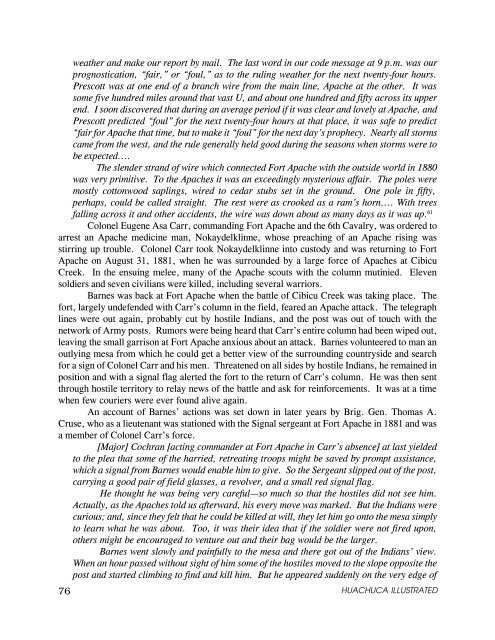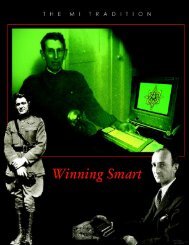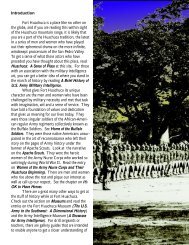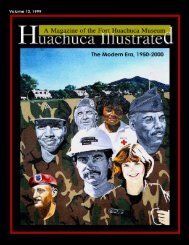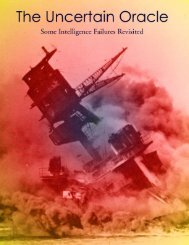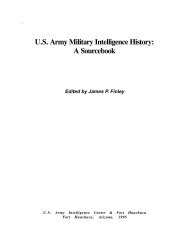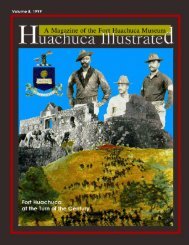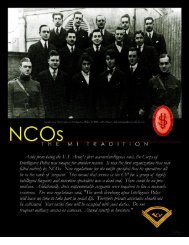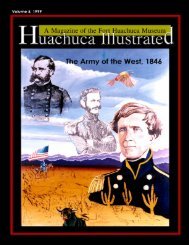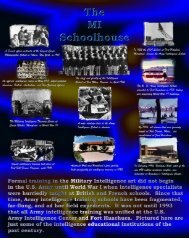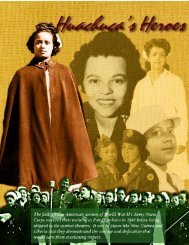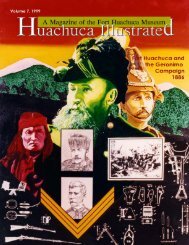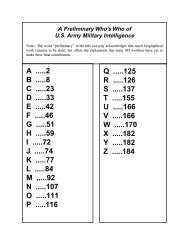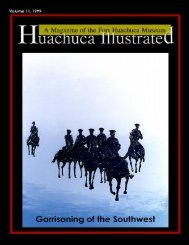Apache Campaigns - Fort Huachuca - U.S. Army
Apache Campaigns - Fort Huachuca - U.S. Army
Apache Campaigns - Fort Huachuca - U.S. Army
Create successful ePaper yourself
Turn your PDF publications into a flip-book with our unique Google optimized e-Paper software.
weather and make our report by mail. The last word in our code message at 9 p.m. was our<br />
prognostication, “fair,” or “foul,” as to the ruling weather for the next twenty-four hours.<br />
Prescott was at one end of a branch wire from the main line, <strong>Apache</strong> at the other. It was<br />
some five hundred miles around that vast U, and about one hundred and fifty across its upper<br />
end. I soon discovered that during an average period if it was clear and lovely at <strong>Apache</strong>, and<br />
Prescott predicted “foul” for the next twenty-four hours at that place, it was safe to predict<br />
“fair for <strong>Apache</strong> that time, but to make it “foul” for the next day’s prophecy. Nearly all storms<br />
came from the west, and the rule generally held good during the seasons when storms were to<br />
be expected....<br />
The slender strand of wire which connected <strong>Fort</strong> <strong>Apache</strong> with the outside world in 1880<br />
was very primitive. To the <strong>Apache</strong>s it was an exceedingly mysterious affair. The poles were<br />
mostly cottonwood saplings, wired to cedar stubs set in the ground. One pole in fifty,<br />
perhaps, could be called straight. The rest were as crooked as a ram’s horn.... With trees<br />
falling across it and other accidents, the wire was down about as many days as it was up. 61<br />
Colonel Eugene Asa Carr, commanding <strong>Fort</strong> <strong>Apache</strong> and the 6th Cavalry, was ordered to<br />
arrest an <strong>Apache</strong> medicine man, Nokaydelklinne, whose preaching of an <strong>Apache</strong> rising was<br />
stirring up trouble. Colonel Carr took Nokaydelklinne into custody and was returning to <strong>Fort</strong><br />
<strong>Apache</strong> on August 31, 1881, when he was surrounded by a large force of <strong>Apache</strong>s at Cibicu<br />
Creek. In the ensuing melee, many of the <strong>Apache</strong> scouts with the column mutinied. Eleven<br />
soldiers and seven civilians were killed, including several warriors.<br />
Barnes was back at <strong>Fort</strong> <strong>Apache</strong> when the battle of Cibicu Creek was taking place. The<br />
fort, largely undefended with Carr’s column in the field, feared an <strong>Apache</strong> attack. The telegraph<br />
lines were out again, probably cut by hostile Indians, and the post was out of touch with the<br />
network of <strong>Army</strong> posts. Rumors were being heard that Carr’s entire column had been wiped out,<br />
leaving the small garrison at <strong>Fort</strong> <strong>Apache</strong> anxious about an attack. Barnes volunteered to man an<br />
outlying mesa from which he could get a better view of the surrounding countryside and search<br />
for a sign of Colonel Carr and his men. Threatened on all sides by hostile Indians, he remained in<br />
position and with a signal flag alerted the fort to the return of Carr’s column. He was then sent<br />
through hostile territory to relay news of the battle and ask for reinforcements. It was at a time<br />
when few couriers were ever found alive again.<br />
An account of Barnes’ actions was set down in later years by Brig. Gen. Thomas A.<br />
Cruse, who as a lieutenant was stationed with the Signal sergeant at <strong>Fort</strong> <strong>Apache</strong> in 1881 and was<br />
a member of Colonel Carr’s force.<br />
[Major] Cochran [acting commander at <strong>Fort</strong> <strong>Apache</strong> in Carr’s absence] at last yielded<br />
to the plea that some of the harried, retreating troops might be saved by prompt assistance,<br />
which a signal from Barnes would enable him to give. So the Sergeant slipped out of the post,<br />
carrying a good pair of field glasses, a revolver, and a small red signal flag.<br />
He thought he was being very careful—so much so that the hostiles did not see him.<br />
Actually, as the <strong>Apache</strong>s told us afterward, his every move was marked. But the Indians were<br />
curious; and, since they felt that he could be killed at will, they let him go onto the mesa simply<br />
to learn what he was about. Too, it was their idea that if the soldier were not fired upon,<br />
others might be encouraged to venture out and their bag would be the larger.<br />
Barnes went slowly and painfully to the mesa and there got out of the Indians’ view.<br />
When an hour passed without sight of him some of the hostiles moved to the slope opposite the<br />
post and started climbing to find and kill him. But he appeared suddenly on the very edge of<br />
76<br />
HUACHUCA ILLUSTRATED


